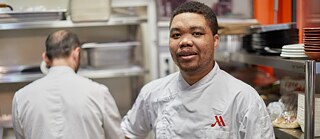Jeffrey Mulaudzi

“Always have a goal in mind - for example, I would like to open a South African restaurant in Germany.”
Trained Chef at the Marriot Hotel, MünchenApprenticeship completed at the Hotel Villa Mittermeier in Rothenburg ob der Tauber
1. Why did you decide to do this apprenticeship in Germany?
The culinary industry is very competitive and fast-paced, meaning one must always be one step ahead. In this regard, I feel that Germany offers one of the best apprenticeships for the profession that I am in. Looking back, I can see that having done the apprenticeship in Germany has allowed me the opportunity to learn a lot more than I could have elsewhere.
2. How did you find out about the apprenticeship and how did you prepare yourself?
I was very lucky because at my previous job, I had an opportunity to meet Christian Mittermeier during his visit to South Africa. He informed us about the apprenticeships offered at his hotel and after researching what it entails, I knew this is what I wanted to do as I was very interested in learning about other cultures. I participated in an interview process and thereafter, I prepared myself by completing the A1 German language course at the Goethe-Institut. As I did not know anything about Germany, the language course taught me about the culture as well as provided an insight into the way of life in Germany.
The hotel where I completed my apprenticeship provided me with support for the visa application and assisted me with my flight arrangements.
3. What personal and professional requirements do you think are important for this occupation?
You should be self-motivated to enjoy working in this field. Being a trained chef requires discipline and enthusiasm. Sometimes you learn about the simplest aspects of food in a complicated and interesting way, which provides you with a new perspective. Time management and communication play a vital role in the kitchen, as we are often working under pressure. Working in the kitchen often means working in large intercultural teams, therefore, you must be willing to adapt and compromise.
Furthermore, those interested in this apprenticeship should hold a school-leaving certificate with subjects such as mathematics and home economics.
4. What do you learn at the vocational school and what do you learn at the hotel?
The theoretical part of the apprenticeship includes food and beverage science, a basic understanding of legal issues relevant to the profession, as well as technical calculations. In addition to learning German, we also attended classes in social studies. At the hotel, we had a chance to work in the different departments where we learned about service, food preparation, hygiene, and menu planning.
5. What advice do you have for South Africans who are interested in this apprenticeship?
I would advise anyone interested in this apprenticeship to not doubt themselves and make the decision as soon as possible. It is important to be inquisitive and to be someone who enjoys travelling because there are so many opportunities for a trained chef here in Germany and around the world.
6. What tasks are you responsible for today?
I currently work as chef de partie, meaning I oversee a certain area of production in the restaurant. I have cooks that I work with, which allows me to lead and be part of a team. In my team, we have other apprentices and a demi chef de partie who assists in the preparation of the food. The department that I work in is called “banqueting”, which involves organizing and planning menus for events such as weddings and conferences.
7. Which tasks do you enjoy the most and why?
The best part about the job is cooking for famous guests or soccer teams, as I am a soccer fan. Sometimes though, this comes with strict dietary requirements, meaning I need to be creative when preparing the food. I also enjoy working with different colleagues from all over the world who teach me about other cuisines. Since the kitchen can be stressful at times, I enjoy being part of the solution when we have a problem.
8. What are your career goals?
I would like to open a restaurant with my brother - who is also a trained chef here in Germany. We are interested in offering dishes that showcase the different cultures in South Africa and Germany.
This interview was conducted by Sinenhlanhla Buthelezi. We are lucky to have Buthelezi in the media development department of the Deutsche Welle Academy.